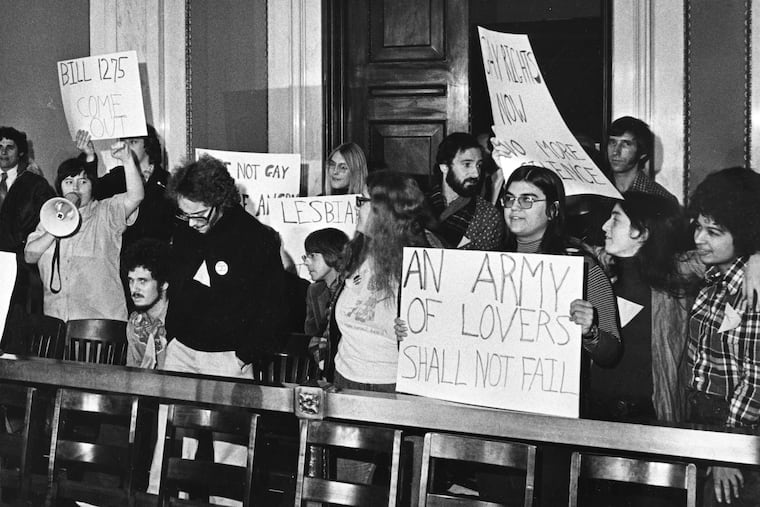The day Philly’s radical lesbians took on City Hall
In 1975, the Dyketactics showed up demanding equal rights and were beaten by police. A new generation wants to tell their story — and others like it.

City Council hoped that a long-stalled nondiscrimination bill would die quietly, ideally behind closed doors, in the winter of 1975. But a group of radical lesbians newly calling themselves “Dyketactics!” had a different plan.
For 20 months, the bill — which would have banned discrimination based on sexual orientation in housing, public accommodations, and employment in Philly — had languished. Now another year was ending. Without any progress, lesbian, gay, and transgender Philadelphians could still be legally fired from their jobs and evicted from their homes.
“Free 1275!” Dyketactics members and other gay activists shouted during City Council’s meeting on Dec. 4, referring to the bill they wanted passed. They held up handwritten signs reading “Dykes Ignite!” and kissed and embraced while Council President George Schwartz pounded his gavel.
The Dyketactics’ protest, and the violence that would unfold in response, garnered national attention and inspired similar civil disobedience across the country. A few weeks later, Dyketactics would become the first LGBTQ group in the nation to sue a city for police brutality against queer people.
But Dyketactics is not widely known today. Neither is much of Philly’s dramatic lesbian history, such as the police raid on the lesbian bar Rusty’s in 1968, a year before Stonewall.
“We are denied a history. It’s almost like we were individuals, we popped out of the sky. You’re the only one,” said Paola Bacchetta, a founding member of Dyketactics who is now the group’s archivist, and a professor of gender and women’s studies at the University of California, Berkeley.
Many of the country’s LGBTQ archives primarily document white gay male history, said Bob Skiba, curator of Philly’s William Way archives, which has been working in recent years to expand its collections.
A new Philly project called “Ephemera: A Lesbian Memory Hotline” is trying to fill in the gaps. The collective, public archive is seeking stories “from and about lesbian identity to add to the incomplete record of lesbian culture in Philadelphia.” People are encouraged to call in and share their short stories on the project’s voice mail at 215-252-0742. The hotline was launched at the end of 2022 by Nia Benjamin, director of creative projects at Intercultural Journeys, a performing arts organization.
Benjamin was at the William Way archives conducting research for a play when they saw the words “lesbian hotline” in the 1970s feminist magazine WICCA. Inspired by the phrase and aware of how much history remained undocumented, Benjamin designed lavender fliers featuring a landline (part of Benjamin’s broader fascination with vintage tech equipment) and tear-off tabs. The fliers are now posted in coffee shops, bars, and museums across the city; people’s stories will ultimately be shared online.
“I think it’s abundantly clear now that government and legislature won’t protect us,” said Benjamin, 28. “The goal of this is to remind people in the lesbian community and in the queer community at large that we have channels of communicating with each other and being together and remembering.”
That 1975 day at City Hall remains seared in the minds of those who were there. While the activists chanted, the sergeant-at-arms forcibly kicked them out of City Council chambers, dragging one woman by her hair, according to Sherrie Cohen, a founding Dyketactics member who was at the protest and is currently running for an at-large City Council seat.
Dyketactics and their allies regrouped in the hallway, where they raised a 13-foot witch puppet that belonged to the Bread and Puppet Theater and continued chanting, according to news reports. But then the Philadelphia Civil Disobedience squad, a unit of plainclothes police officers tasked with surveilling and disrupting activist groups at the time, surrounded them. Cohen said the officers pushed her group towards the top of the fourth floor stairwell.
“[They] started pushing and kicking us,” Cohen said. “And many of us said, ‘stop kicking, we’ll walk, we’ll walk’ … And we would try to get up and then they would kick us again, all the way down four flights of stairs, until they literally kicked us out of City Hall.”
Bruised and in shock, the group went directly to the emergency room. Later that day, Bacchetta, Cohen, and four other members of the group, who came to be known as the “Dyketactics 6″ decided to file a federal lawsuit against the city. Their trial a year later garnered enormous publicity.
“The city’s lawyers asked us, the DYKETACTICS! plaintiffs, to state whether or not we were lesbians,” Bacchetta wrote later. “In 1976, that simple question was probably the most effective way to discredit our testimony in advance. The media began fairly early on to construct us as insane.”
Ultimately, Dyketactics lost at trial. Philadelphia did not pass a sexual orientation nondiscrimination bill until six years later, in 1982.
Bacchetta worries that not having access to a full history cuts off today’s queer movement from some of its most radical and creative elements. Dyketactics members saw gay and trans rights as part of a broader struggle for equality, Bacchetta said.
“I got up early for the revolution (as I was convinced it would arrive any morning sometime soon),” she wrote.
Dyketactics members continue to stay in touch almost daily in a private Facebook group. Recently the group unanimously agreed to donate its archives, including position papers, trial transcripts, personal photos, and song lyrics, to Yale University, with a digital version finding a home at William Way. Both Cohen and Bacchetta are eager to see what the lesbian memory hotline uncovers.
“If you don’t find ways to tell your own story and get it out there,” Cohen said, “then it might not be told.”